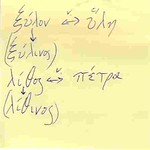Paul-Nitz wrote:This is a wonderful way to pick up, or solidify vocabulary. ... I like the first "stream of consciousness" sort of composition
The main point of the approach is that the ego of the teacher has to be put aside. The current approach of, "You are standing in a completely dark room with no points of reference." and "I your teacher are going lead and guide you and show you, and give meaning and light" should be gotten over and moved on from. Power structures in adult education have changed and consequently so have the approaches to teaching and learning that are suitable for adult classroom. The need for any of the fake mystery that is used to confirm the position of teacher has gone and needs to be gotten rid of. I think for adult learners it is important to let them teach themselves from their own background knowldege as much as possible.
Compare the following 4 sentences:
- ῥαφίς is a popular word for βελόνη.
- I want to buy a ῥαφίς. / I want to purchase a βελόνη.
- I man wanted to mend his tunic but had nothing to pull the thread to sew the patch to his tunic. His wife told him to go to the market and buy a new ῥαφίς to replace the one that he had lost. When he got to the market he found a ῥαφίς that he would like to buy. He pointed at it and said, "I would like to purchase that βελόνη, if you don't mind."
- A man looked into his βελονοθήκη and found he had no ῥαφίς. We went to the market and found a stall with the sign that said, "βελόνη". Then he bought a ῥαφίς from the βελονοπώλης.
What are the teacher assumptions and expected learner reactions to those ways of presenting?
- It assumes that students will notice the difference in register (formal / informal) between the two words, and perhaps assumes the student knows one of the words already. Learner responses would range from bewilderment for their own ignorance to awe at the teacher's knowledge.
- Agin, it assumes that students will notice the difference in register (formal / informal) between the two words "buy" and "purchase", and assumes students know both of the words already. Learner responses would range from from missing the point, to bewilderment for their own ignorance, to awe at the teacher's knowledge.
- No knowledge is assumed. Studnets would probably be able to correctly assume the meaning and nuance of the two words.
- There is a whole lot of derivational morphology assumed here, which would suit an intermediate student. Students would aquire not only the target words, but may also aquire some related words.
Due to the limitation of my knowledge of Greek, I don't know if there is any indication that the material used to make the two was different, but that is possible. Concept checking questions could include material specific questions like, "What is the ῥαφίς made of?" (Expected answer: Fish bone, bronze). "How would the eye be put into the ῥαφίς?" (Expected answers: Drilling for bone. Stamping for bronze.) or they could be avoided to avoid teacher's ignorance.
The way that I've heard ἀποθήκη as being being related to the word Boutique is misleading in many ways. Boutique is a public place and is a shop. Both of those elements of meaning are not in words ending in -θήκη, which have have the sense of private, personal use, at home use, and generally the things that can be put in them are put into it (or onto it) by hand.
Paul-Nitz wrote:There is the problem of whether or not to use the grammatically correct form. [I don't so much like] the disconnected sentences used for εχειν.
The way that English has borrowed the majority of its loan-words would be to not use any grammaticisation at all. I've used full Greek words because ultimately my aim is not to further enrich the English vocabulary, but rather to learn Greek dictionary items.
I haven't thought through the presentation of grammar to the same extent as the presentation of vocabulary, as you can see. Honestly speaking, even after all these years if someone asked me an in-what-circumstances-do-we-use-the-tense question, I wouldn't be able to give an exhaustive answer.
